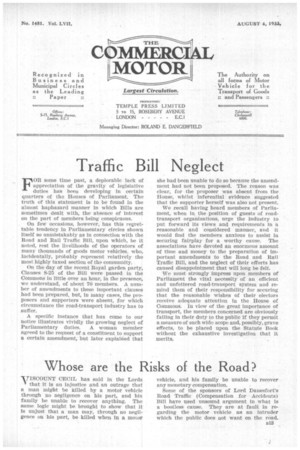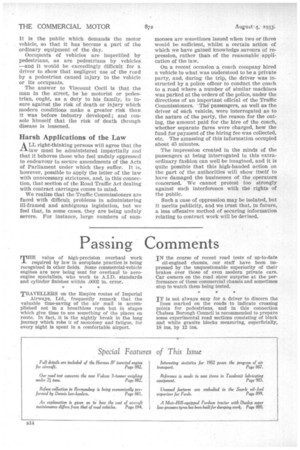Whose are the Risks of the Road?
Page 23

Page 24

If you've noticed an error in this article please click here to report it so we can fix it.
TISCOUNT CECIL has said in the Lords that it is an injustice and an outrage that a man might be killed by a motor vehicle through no negligence on his part, and his family be unable to recover anything. The same logic might be brought to show that it Is unjust that a man may, through no negligence on his part, be killed when in a motor vehicle, and his family be unable to recover any monetary compensation.
Some of the sponsors of Lord Danesfort's Road Traffic (Compensation for Accidents) Bill have used unsound argument in what is a bootless cause. They are at fault in regarding the motor vehicle as an intruder which the public does not want on the road. It is the public which demands the motor vehicle, so that it has become a part of the ordinary equipment of the day.
Occupants of vehicles are imperilled by pedestrians, as are pedestrians by vehicles —and it would be exceedingly difficult for a driver to show that negligent use of the rood by a pedestrian caused injury to the vehicle or its occupants.
The answer to Viscount Cecil is that the man in the street, be he motorist or pedestrian, ought, as a duty to his family, to insure against the risk of death or injury which modern conditions make a greater risk than it was before industry developed ; and console lihnself that the risk of death through disease is lessened.
Harsh Applications of the Law
ALL right-thinking persons will agree that the law must be administered impartially and that it behoves those who feel unduly oppressed to endeavour to secure amendments of the Acts of Parliament under which they suffer. It is, however, possible to apply the letter of the law with unnecessary strictness, and, in this connection, that section of the Road Traffic Act dealing with contract carriages comes to mind.
We realize that the Traffic Commissioners are faced with difficult problems in administering ill-framed and ambiguous legislation, but we feel that, in some cases, they are being unduly severe. For instance, large numbers of sum naonses are sometimes issued when two or three would be sufficient, whilst a certain action of which we have gained knowledge savours of repression, rather than of the reasonable application of the law.
On a recent occasion a coach company hired a vehicle to what was understood to be a private party, and, during the trip, the driver was instructed by a police officer to conduct the coach to a road where a number of similar machines was parked at the orders of the police, under the directions of an important official of the Traffic Commissioners. " The passengers, as well as the driver of each vehicle, were interrogated as to the nature of the party, the reason for the outing, the amount paid for the hire of the coach, whether separate fares were charged, how the fund for payment of the hiring fee was collected, etc. The amassing of this information occupied about 45 minutes.
The impression created in the minds of the passengers at being interrogated in this extraordinary fashion can well be imagined, and it is quite possible that this high-handed action on the part of the authorities will show itself to have damaged the businesses of the operators concerned. We cannot protest too strongly against such interference with the rights of the public.
Such a case of oppression may be isolated, but it merits publicity, and we trust that, in future, a less offensive method of securing information relating to contract work will be devised.




















































































